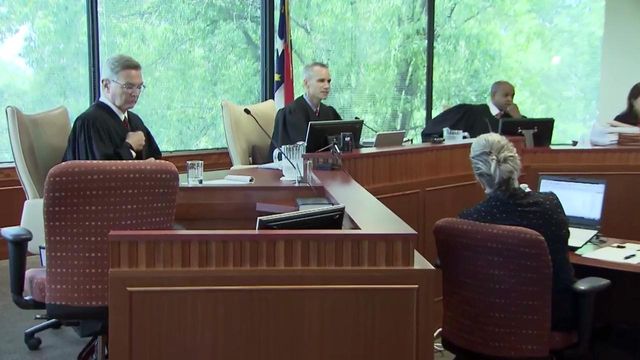Voter ID requirement faces new court challenge
North Carolina's new requirement that voters present photo identification at the polls will prevent numerous people from voting, an attorney for six voters argued Friday.
Posted — UpdatedA panel of three Superior Court judges heard arguments Friday about whether to issue an injunction to halt the voter ID law, which legislators have already delayed until next year.
The ID requirement was added to the state constitution after last fall's election, but Allison Riggs, an attorney representing the six voters challenging the law, noted North Carolina has a checkered history with voter ID. A 2013 law putting in in place was later thrown out by a federal court that ruled the effort was aimed "with almost surgical precision" at keeping minority voters from the polls.
No current data is publicly available, Riggs said, but 2015 data shows blacks are more likely than whites not to possess a state-issued ID. Even when voters said they had a "reasonable impediment" that prevented them from having an ID in the sole election when IDs were required before the law was overturned, elections officials threw out 184 of their votes, she said.
"The character of the burden [presented by voter ID] ranges from total disenfranchisement to very severe burdens, either obtaining IDs or navigating the administrative process necessary to cast a ballot," Riggs argued.
The six plaintiffs include two disabled people, two people whose votes weren't counted in the 2016 election when voter ID was used and two college students. The two disabled voters would be hard-pressed to obtain a photo ID, Riggs said, while the prospect of the other four being allowed to vote is "truly at the whim of poll workers" because of the array of IDs that may or may not be considered valid for voting.
"It's going to take time to sort through all of [which IDs can be used], and these front-line poll workers only get trained two weeks before the election," Riggs said. "The idea that this isn't going to create confusion and lines that lead to disenfranchisement is just not tenable."
But David Thompson, an attorney representing lawmakers, said none of the six plaintiffs should be allowed to challenge the law because they haven't been harmed by it. The two disabled voters can easily state they have a reasonable impediment to getting an ID, more college IDs are allowed under the new rules than under the 2013 law and the two who were affected in 2016 cannot presume the same thing will happen in the future, he said.
Thompson called North Carolina's requirement "one of the most lenient laws in the country for voter ID."
"Why would the legislature mandate voter outreach and education if this was to be a tool for disenfranchisement? Why would they make a free ID with no documentation available?" he asked. "[The plaintiffs] have no answers to these questions."
Riggs also argued that implementing the requirement with the 2020 election doesn't provide enough time to prepare voters for the change.
Special Deputy Attorney General Paul Cox, who represented the State Board of Elections, noted that elections officials need to start putting things in place in September for next spring's primary, and a halt to the voter ID process that might later be overturned on appeal would adversely affect preparations.
The judges said they hope to have a ruling in the next week or two.
Related Topics
• Credits
Copyright 2024 by Capitol Broadcasting Company. All rights reserved. This material may not be published, broadcast, rewritten or redistributed.






